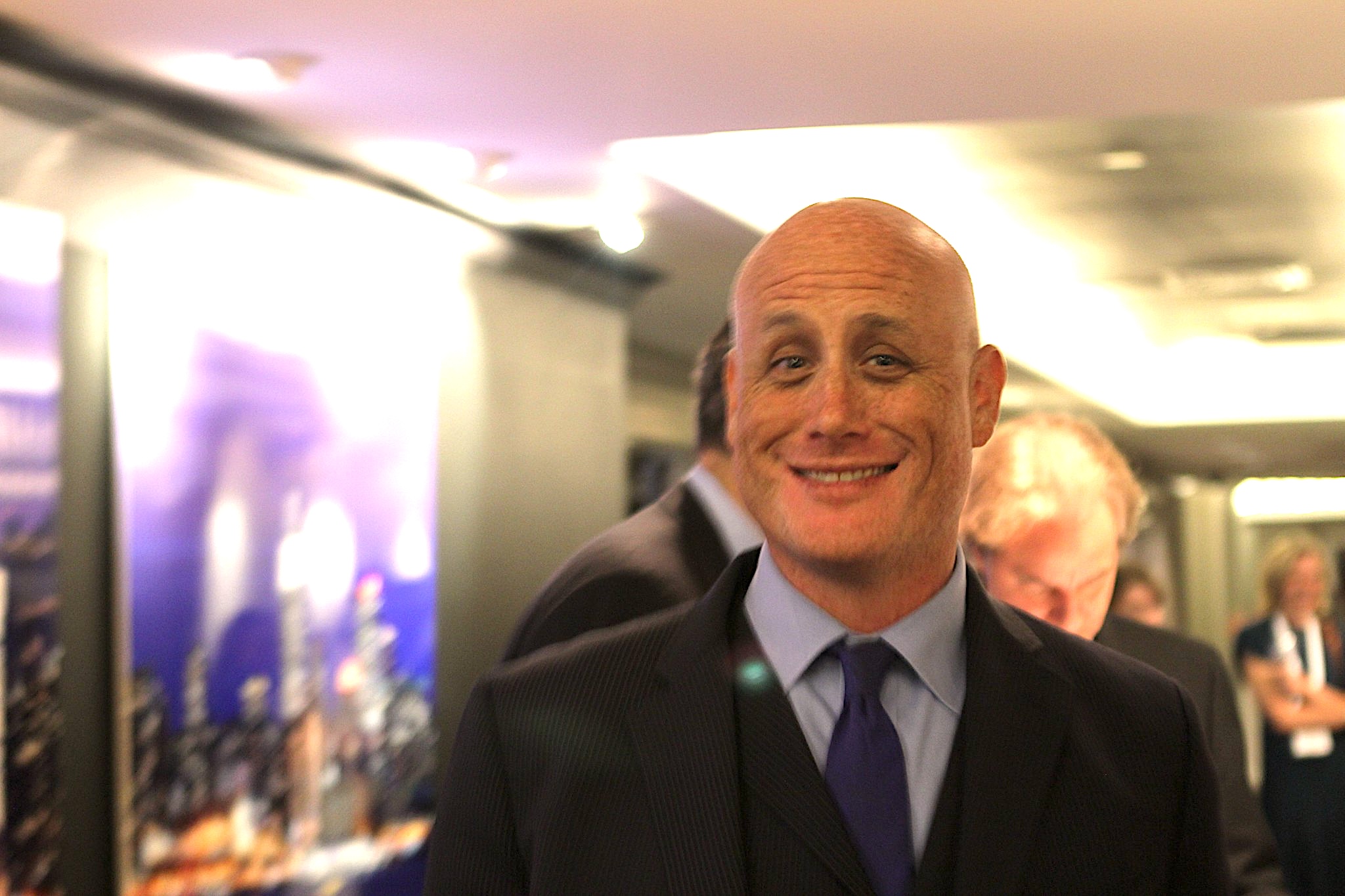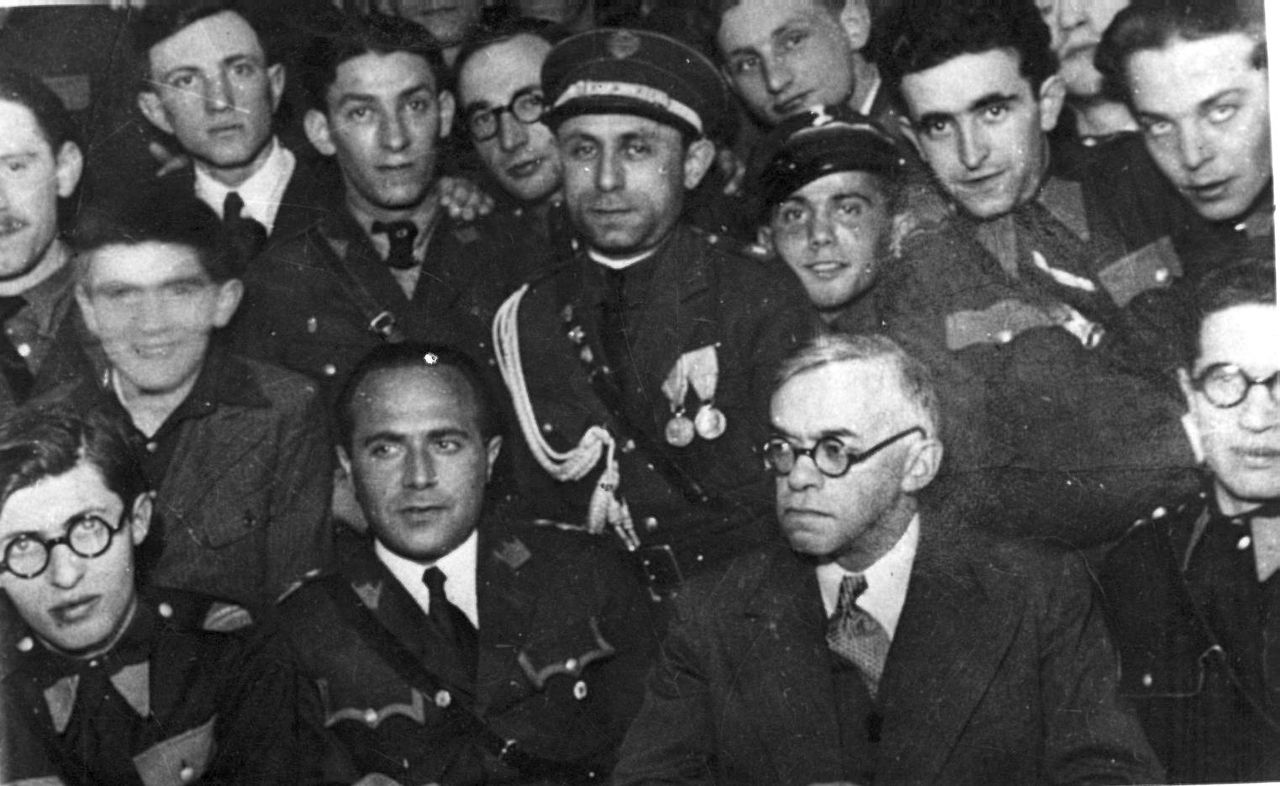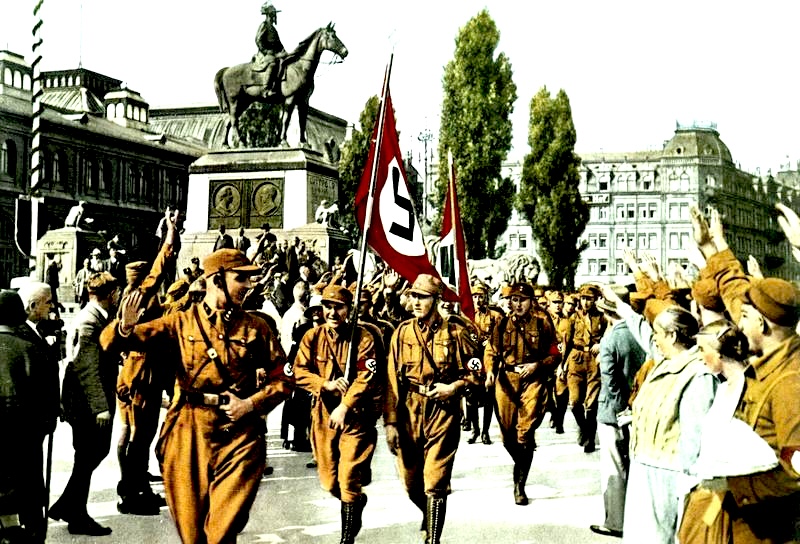By Alan McLeod, Mintpress News, 3/25/25
A far-right, pro-Israel group with a history of support for terror and genocide is working closely with the Trump administration, preparing dossiers on thousands of pro-Palestine figures it wants deported from the United States.
Betar U.S. is known to have had several meetings with senior government officials and has claimed credit for the arrest and detention of Mahmoud Khalil, a leader of the nationwide anti-genocide student demonstrations that began at Columbia University last year.
Ross Glick, the group’s executive director until last month, noted that he met with a diverse set of influential lawmakers, including Democratic Sen. John Fetterman and aides to Republican Senators Ted Cruz and James Lankford, and that all supported Betar U.S.’ campaign to rid the country of thousands of “terror supporters.”
Shortly after Glick’s trip to Washington, D.C., Trump signed an executive order titled “Additional Measures to Combat Anti-Semitism” that promises “the removal of resident aliens who violate our laws,” to “quell pro-Hamas vandalism and intimidation” and to “investigate and punish anti-Jewish racism in leftist, anti-American colleges and universities.”
Trump himself announced that Khalil’s arrest, which made worldwide headlines, was “the first of many to come.”
“We know there are more students at Columbia and other Universities across the country who have engaged in pro-terrorist, anti-Semitic, anti-American activity, and the Trump administration will not tolerate it,” he wrote on Truth Social.
The 45th and 47th president has also stated that he plans to deport “Communists” and “Marxists” from the United States, even those who are citizens. As such, this marks an escalation in government-backed suppression of dissent not seen since the McCarthyist era of the 1940s and 1950s.
Carrying Out Terror, Supporting Genocide

Glick in 2012. (Iryna Kremin/Flickr/CC BY-NC-SA 2.0)
Betar U.S. describes itself as a “loud, proud, aggressive and unapologetically Zionist” movement “dedicated to defending Israel’s legitimacy and strengthening the Jewish connection to the land of Israel.” This includes “taking action where others won’t” — a rather ominous phrase, considering the aggressive activities of the Jewish organizations it derides as “passive” and weak.
Last week, the group appeared to openly attempt to organize an assassination attempt on Francesca Albanese, the United Nations special rapporteur on the Occupied Palestinian Territories. “Join us to give Francesca a [pager emoji] in London on Tuesday,” it posted online, an apparent reference to the September pager attack on Lebanon carried out by the Israeli military.
The incident killed dozens of people and injured thousands more civilians, and was widely condemned — even by former C.I.A. Director Leon Panetta — as an act of international terrorism.
Last month, Betar U.S. made a similar threat against Jewish-American writer Peter Beinart. After The New York Times published his article criticizing the State of Israel, Betar put out a statement reading, “We urge all Jews on the Upper West Side to give Peter Beinart a [three pager emojis]. He is a traitor, a kapo, and we must oppose him.” Thus, Betar not only smeared him as a Nazi collaborator (Kapo) and called for his assassination but also appeared to reveal Beinart’s home location.
[Related: Abandoning the Role of Conqueror]
A similar incident involved political scientist Norman Finkelstein. In an effort to intimidate him into silence, a Betar member slipped a pager into his coat pocket, filming the incident. After Finkelstein refused to stop speaking out against injustice in the Middle East, last weekend, the group attempted to break up his public event in Washington, D.C.
Perhaps most outrageously, Betar has also publicly placed a bounty on the head of Palestinian-American activist Nerdeen Kiswani, telling her that, “You hate America, you hate Jews, and we are here and won’t be silent. $1,800 to anyone who hands that jihadi a beeper,” and later repeating the offer.
After worldwide pushback, the organization has deleted its posts calling for political killings of international officials and U.S. citizens.
In addition, Betar has regularly attempted to intimidate or shut down movements or gatherings protesting Israeli crimes. At a student event at UCLA, Betar publicly stated, “We demand police remove these thugs now and if not we will be forced to organize groups of Jews to do so.”
In January, it tried to break up a New York City vigil for Hind Rajab, a 5-year-old Palestinian girl brutally murdered by Israeli forces. Betar members filmed the event, telling attendees they were with Immigration, Customs and Enforcement (ICE) and using facial recognition technology to obtain their identities, which would subsequently be used to deport them.
In recent weeks, Betar members have also chanted hate speech outside a Bangladeshi mosque in New York City and attacked people who protested the illegal sale of Occupied West Bank land at an auction in Brooklyn.
That Betar is a hate group is barely in question. Even notoriously pro-Israel groups such as the Anti-Defamation League (an organization the F.B.I. once noted was almost certainly being bankrolled by the Israeli government) have included it in its list of extremist hate organizations.
The ADL notes that Betar uses the fascist Kahanist slogan, “For every Jew, a .22” (meaning Jews should be armed with .22 rifles) and has indicated it wishes to work with the Proud Boys, a far-right American gang.
Betar frequently revels in violence against civilian populations and calls for genocide against Palestinians.
“Fuck your ceasefire!! Turn Gaza to rubble!!” they announced last month. “Betar firmly supports the plan to remove Palestinians from Gaza,” they added. In response to a post detailing the vast numbers of Palestinian babies killed since Oct.7, 2023, it replied, “Not enough. We demand blood in Gaza!”
A Fascist Paramilitary – But Jewish

Zeev Jabotinsky, bottom right, circa 1939, meeting with Betar leaders in Warsaw. Bottom left Menachem Begin. (Wikimedia Commons/Public domain)
Betar traces its origins back over 100 years. The group was founded by early Zionist leader Ze’ev Jabotinsky as a far-right paramilitary force, one that explicitly stood against the leftist Jewish groups who dominated at a time when “Jewish” and “socialist” were seen by many as virtually synonymous.
Jabotinsky believed that establishing a state in Palestine would require the creation of what he called a “new Jew,” one that would be willing to fight and die for Zionism. To this end, Betar was established as a fighting organization and received generous funding from conservative benefactors.
Jabotinsky instructed members to swear an oath to the unborn Israel: “I devote my life to the rebirth of the Jewish State, with a Jewish majority, on both sides of the Jordan.” The creation of such a state, therefore, would require the mass extermination or expulsion of the region’s native inhabitants.
Betar’s formal name was Brit Yosef Trumpeldor, named after a Jewish settler who was killed in 1920 in an early firefight with Palestinians over disputed land. It was exactly men like Trumpeldor who Jabotinsky believed were necessary in order to win, in contrast to the majority of European Jews, who he saw as passive and weak.
Europe in the 1920s was a time of rising anti-semitism, and despite their inherent anti-Jewish nature, many conservative Jews admired the discipline and organization of fascist paramilitaries such as Hitler’s Brownshirts. Betar was modeled on these groups, with Jabotinsky believing the Zionist project’s success was dependent on the establishment of such organizations.
[See: ‘Brown Shirts in Zion’ by Robert Gessner from New Masses, 1935]

The Sturmabteilung, or SA unit, also known as Brown Shirts, in Nuremberg, Germany, in 1929. (Bundesarchiv/ Wikimedia Commons/ CC BY-SA 3.0 de)
Because of their anti-communist, anti-worker outlook, conservative money flooded into Betar, helping it become one of the largest and most influential Jewish organizations by the 1930s, with membership rising to around 70,000 people.
Betar leaders would go on to become key figures in Israeli politics. These included Prime Ministers Menachem Begin and Yitzchak Shamir, as well as Benzion Netanyahu, the father of current Prime Minister Benjamin Netanyahu.
While this depiction of Betar as a fascist terrorist group might sound biased or one-sided, much of this information comes directly from the organization itself.
On its official website’s “Our History” section, Betar writes (emphasis added):
“Betar thus became an incubator for the development of right-wing Zionist ideas and its supporters were sometimes referred to as ‘Jewish Fascists.’ In Palestine, Betar members facilitated illegal Jewish immigration and were active instigators of disturbances and violence, frequently bombing Arab civilian areas in response to attacks and waging guerilla [sic] warfare against the British.”
Thus, the organization does not shy away from the fascism label, and it proudly notes that it “frequently” carried out terror operations against Arab civilians in Palestine. (At some point in the past week, after it began receiving increased scrutiny for its connections to the Trump administration, Betar has removed both the “fascist” moniker and the boast about bombing Arabs, but the original page can still be viewed via the Internet Archive.
Since Oct. 7, 2023, Betar has greatly upped its presence in the United States, thanks to far-right Israeli-American businessman Ronn Torossian and Executive Director Ross Glick.
In July 2024, it successfully applied for tax-exempt nonprofit status, meaning it is classified by the government as a charity.
“Since our revival in 2024, Betar has made a powerful impact across the U.S. and is just getting started. We are recruiting, developing, and empowering Jews to become unapologetic Zionist leaders — defending Israel on campuses, in communities, and across all platforms,” Betar writes. Yet an investigation by The Electronic Intifada suggests that Betar might have been illegally fundraising.
The same report notes that Glick has faced serious allegations of sex crimes. In 2019, his former girlfriend found nude images of herself posted on her company’s official Instagram, Facebook, and Twitter pages. Glick was arrested and charged with unlawful use of a computer and unlawfully posting the lewd pictures. He pleaded guilty to second-degree harassment, a violation, and paid a fine.
Commentators across the political spectrum agree that the Trump administration is pushing the United States in a rightward direction, in the process running roughshod over constitutional protections and guarantees. In doing so, they have found allies in many controversial groups. That such a small and new movement like Betar U.S. already enjoys such influence within the White House has already raised eyebrows. And given Israel’s determination to continue its genocidal campaigns against its neighbors —and Trump’s limitless support for its ally — it appears likely that Betar’s will grow under the current administration.
If this is the case, that is bad news for those who value the right to speak freely and to protest. It is therefore crucial that this group be understood and scrutinized rather than be allowed to operate in the shadows behind closed doors.
Alan MacLeod is senior staff writer for MintPress News. After completing his PhD in 2017 he published two books: Bad News From Venezuela: Twenty Years of Fake News and Misreporting and Propaganda in the Information Age: Still Manufacturing Consent, as well as a number of academic articles. He has also contributed to FAIR.org, The Guardian, Salon, The Grayzone, Jacobin Magazine, and Common Dreams.
This article is from MPN.news, an award winning investigative newsroom. Sign up for their newsletter.
Like this:
Like Loading...


